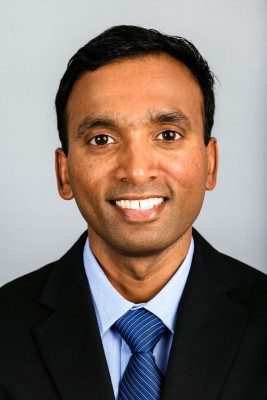
The billboard, at first glance, follows a familiar pattern. A man in dark underwear crouches in a flexible—if not entirely comfortable—position, showing off his biceps and abdominal muscles. But he doesn’t look anything like your typical model: Instead he sports a boxy watch, scruffy beard, and thick glasses. “Find the hottest tech talent,” the billboard boasts, “Dice.com/openweb.” This marketing campaign went viral within hours after it launched, and it showcases Dice’s quirky, innovative approach to technology recruitment.
Dice.com is one of the leading websites for technology professionals and recruiters to connect, in no small part because president Shravan Goli understands the needs of both parties. Goli began his career as a developer before transitioning to the business side of technology, building his skill set at Microsoft, Yahoo, and as CEO of Dictionary.com. He knows how to keep his focus on long-term strategy, as a business leader, and he also understands what technology professionals are looking for. “I understand their mind-set, their behavior, their approach to career building and development,” he explains. “As a technology professional, you think about skills. You consider what skills you want to learn and add to your portfolio. You don’t worry so much about titles.”
Tech experts, Goli explains, go through cycles throughout their careers, and that means they use Dice to fill different needs: some are actively seeking employment; others are happily employed but want to stay updated on the latest skills; still others are employed but look for new opportunities or want to compare salaries. Because Dice has been in the technology recruiting business for more than twenty years, many of these professionals know that they can do all of this on the website. Dice has grown into a trusted brand for professionals, and that makes it a key resource for recruiters.
“Dice has always been an epicenter for aggregating the kind of information both employers and employees need: markets, trends, salaries, in addition to job postings,” Goli says.
Many industry shifts have influenced Dice’s strategy and outreach efforts recently, and the company’s extensive research has allowed it to track the latest developments better than most. One trend Goli has observed is that tech professionals expect recruiters to reach out to them more than they did in the past. It used to be that recruiters were approached by job-seeking professionals, but the roles have flipped. This is due in large part, he adds, to the dearth of technology professionals available in a market with many job openings. Technology professionals know they are in demand, Goli says, now more than ever. The unemployment rate among tech experts is rapidly decreasing—in some areas, it is as low as 2.7 percent. Because they know they are in demand, professionals expect more from recruiters. They want recruiters to understand who they are and why the opportunity they offer is better than what the professional already has. Dice has reacted to this trend by helping recruiters engage candidates in new ways, among them to build a presence on websites where professionals spend their free time.
That is the basis of another major trend influencing Dice. Many of today’s technology professionals work to develop their skills in the public eye. Websites like GitHub, as well as events like hackathons, allow technology professionals to build and share projects, and many experts contribute everything from coding to blog posts. This allows them to highlight their skills in an open, social way. The effect of this is that professionals leave a lot of data on the web, and by aggregating it all, recruiters can view a much more nuanced profile of a candidate than a mere résumé. One of Dice’s current projects is to accumulate all of this information, allowing Dice to present a full profile to recruiters. Goli says Dice aggregates open data from more than 130 websites to create a more accurate and detailed picture of its candidates. Knowledge of these individuals’ identities helps recruiters choose people with the skills they need, and it also helps them find professionals whose goals, work ethic, and priorities fit company culture.
Dice regularly writes about all of these trends and how to address them on its website, but recruiters have to do more than know the trends in order to react to them effectively. Many recruiters wonder how they can engage professionals, and Dice offers that answer: understand what moves them. Dice is expanding its presence on mobile platforms and popular websites to connect with the best people. “You have to step out of the box,” Goli explains. “You have to find where the professionals are spending their time—Twitter, Meetup, Quora, Facebook—and reach them there.”
Dice already interacts with recruiters and the recruited in innovative ways many websites would love to duplicate, and it has a number of initiatives on the horizon. One is to play a bigger role in the full cycle of a technology professional’s career. Goli doesn’t want people to come to Dice just to find one job. He wants Dice to be a place they visit over their entire career to learn about new opportunities, trends, and skills. Goli hopes that the data-driven insights Dice creates will continue to grow in number and detail as Dice sources more websites.
The other major initiative up next for the company will be to provide more data to recruiters and their companies. Every organization needs technology, now—from Yahoo and Google to Home Depot and Target—and Goli wants Dice to provide insights that go beyond the web, such as where these companies should open physical offices. “We know populations, skills available, competitiveness for talent, salaries. Dice has that data,” Goli says. “With us, companies can make smart decisions.” In this environment, that is more crucial than ever, he adds. Sourcing talent is difficult in the market, and Dice’s goal is to make trends and data make sense.

